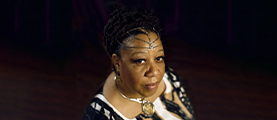Champions of Change: A Celebration of Black Women Changemakers in HIVDázon Dixon Diallo, The Icon


A conversation with Dázon Dixon Diallo, founder of SisterLove, Inc., the first women-focused HIV/AIDS and reproductive justice organization in the southeastern US
A Georgia girl through and through, Dázon Dixon Diallo, founder of SisterLove, Inc.*—the first women’s HIV/AIDS and reproductive justice organization in the Southeastern United States—can trace her grassroots organizing back to a standoff between her mom and her 8th grade biology class. “My mother was our teacher, and we’d gotten to that part where you dissect the frog. I just couldn’t,” she says. She called every one of her classmates and told them not to bring in their frogs the next day. “That was my first protest. I realized what the power of organizing people could do.”
“I realized what the power of organizing people could do.”
At the onset of the AIDS epidemic in the ‘80s, Diallo was working at a reproductive health clinic when the local AIDS organization “organized by gay white men for gay white men” reached out when women started calling, asking, ‘What does this mean for me?’” At the time, the organization didn’t have answers, so Diallo “started volunteering to learn and get engaged.” Then she started to do the math long before many others did. “I was like, ‘Okay, straight women have sex with men, gay men have sex with men; we have something in common that we need to talk about.’” She first created an event called the Safe Sex Party that got women talking about their sexual health at a time when that was taboo. From there, “we created events that were positive, centered on women’s eroticism, our sexuality, but were also very informative, so when they left the workshop, they were ready to go do something, but do it good and do it safe.”
It became the event that sparked her revolutionary organization, SisterLove, Inc., now in its 34th year. “We’re talking HIV, trauma, STIs, reproductive health, and your rights,” says Diallo. “We transformed health education for them.” These days, SisterLove has multiple offerings, including a mobile clinic and outreach initiatives like Healthy Love Experience. “I was 24 when I started SisterLove,” says the activist, compelled to help women survive HIV/AIDS long before there was any research or resources. In the time since, she’s become adept at helping women living with HIV get the educational resources and care they need to live fulfilling lives. Her powerful legacy includes establishing the first-ever support group in Atlanta for women living with HIV, along with numerous other programs and initiatives centered on the intersectional experiences of Black women and women of color, giving them agency in the greater HIV community.
“I can’t get tired,” she says. So committed to the work, her favorite way to decompress is behind the mic of her long-running radio show, where she continues to spread the information needed to help improve women’s lives and motivate others to do the same. She and SisterLove serve as the blueprint for many others advocating for women in HIV/AIDS, and she’s not done yet. Says Diallo, “No matter my role, I can’t give up this fight.”
*This organization is a Gilead grant recipient.